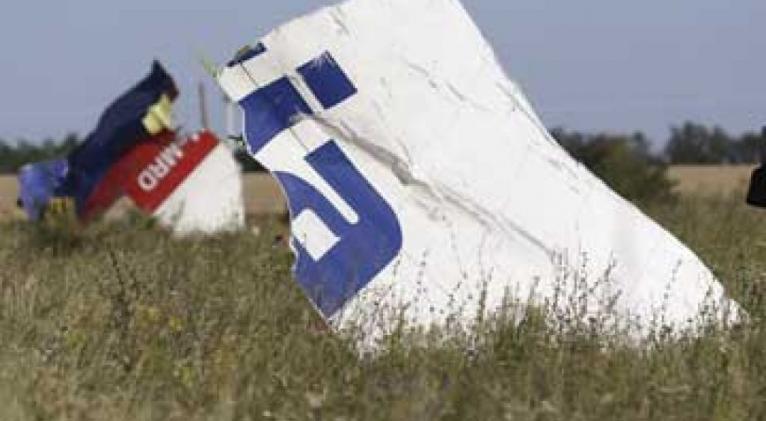Blasts as Experts Finally Reach MH17 Crash Site in Ukraine
especiales

A small team of Dutch and Australian experts accompanied by international monitors reached the vast site of the doomed Malaysia Airlines jet after days of fierce fighting between government forces and rebels had stopped them reaching the area.
The Dutch justice ministry said the team was so far only a "reconnaissance" mission but would hopefully pave the way for more experts to visit soon.
But in a sign of the continuing insecurity, an AFP team following some minutes behind the convoy heard loud blasts just a few kilometres away from the site and saw black smoke rising from a village close to where some of the plane wreckage is lying.
Ukraine's military had earlier announced a "day of quiet" across the entire east after a plea from UN chief Ban Ki-moon to halt fighting in the area of the crash, where remains from some of the 298 victims lie festering in the sun some two weeks after the jet was shot down over rebel territory.
Kiev -- which has continually blamed rebels controlling the site for blocking the probe -- warned however that insurgents had continued shelling its troops positions around the region.
On a visit to the Netherlands, Malaysian Prime Minister Najib Razak appealed for an "immediate cessation in and around the crash site by both Ukraine and separatist forces."
The West says the insurgents likely shot down the plane with a missile on July 17, but Russia and the rebels said it could have been blown out of sky by a Ukrainian jet.
Lawmakers in Kiev ratified agreements with The Hague and Canberra that could see the two nations send some 950 armed personnel to secure the site where many of their nationals died.
The Netherlands has already ruled out the possibility of sending in troops as "unrealistic" over fears they could become entangled in Ukraine's murky conflict that has claimed over 1,100 lives in more than three months of bitter fighting.
Meanwhile, Russia's aviation authorities said a team of their own experts had arrived in Kiev and were hoping to reach the crash site.
Elsewhere, negotiators from Kiev and Moscow were set to fly into the Belarussian capital Minsk for possible talks with rebels over access to the site but there appeared little hope for a major breakthrough.
Separatist leaders have said that they would be willing to meet the so-called trilateral Contact Group -- which includes international monitors, as well as Russian and Ukrainian representatives -- but demanded that Kiev withdraw its troops from their territory as a first condition.
Despite the brief lull, the death toll continued to climb, with Ukraine's army saying 11 soldiers were killed over the past 24 hours and local authorities saying that clashes in the rebel stronghold of Lugansk left three civilians dead, including a five-year-old child, in the same period.
Diplomatic fallout
The rising toll comes against the background of fresh threats from the West that they could tighten the screws still further on Russia over its role in the Ukraine conflict.
A defiant Moscow had warned Wednesday that fresh EU and US sanctions targeting its vital energy, arms and finance sector would backfire on the US and lead to energy price hikes in Europe.
In a statement released by the White House the G7 powers urged the Kremlin to "choose the path of de-escalation" in Ukraine.
If Russia "does not do so, however, we remain ready to further intensify the costs of its adverse actions," the G7 statement said.
But the Russian foreign ministry blasted the United States for hitting the Kremlin over its "independent policies that Washington finds inconvenient."
Some EU diplomats and Russia experts expressed concern that tighter sanctions may in fact embolden President Vladimir Putin, convincing him that he no longer has anything to lose by further escalating the Ukraine conflict.
Fuelling concern, NATO's top commander said Wednesday that Russia had boosted the number of troops along the border with Ukraine to "well over 12,000" and that the figure was on the rise.
Russia also ratcheted up the tension by announcing fresh war games involving surface-to-air missiles along its southern flank with Ukraine, while Kiev demanded an explanation from Moscow over its "military activities close to the border".
Lawmakers in Britain -- where a fresh probe into the radioactive poisoning of Russian spy Alexander Litvinenko is set to stoke fresh tension with Moscow -- warned that NATO is not ready to deal with a military attack by Russia on a member state and must adjust to the unconventional tactics seen in Ukraine.













Add new comment